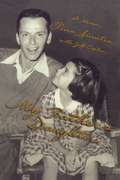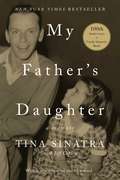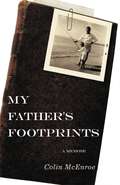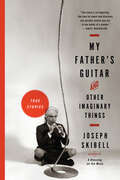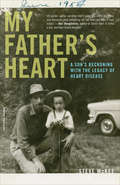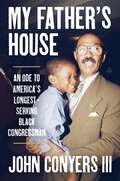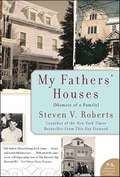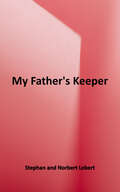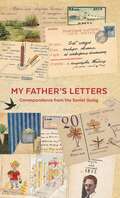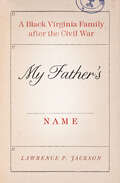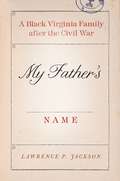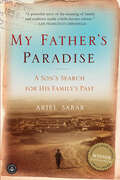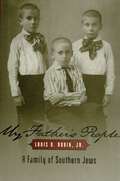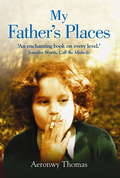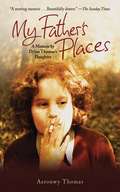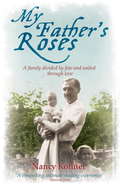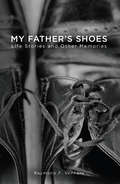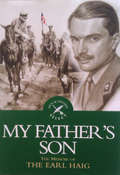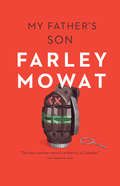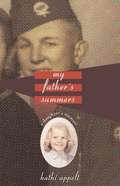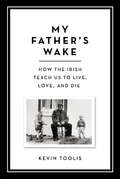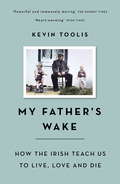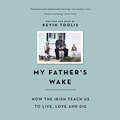- Table View
- List View
My Father's Daughter: A Memoir
by Tina SinatraFrank Sinatra seemed to have it all: genius, wealth, the love of beautiful women, glamorous friends from Las Vegas to the White House. But in this startling and remarkably outspoken memoir, his youngest daughter reveals to us an acutely restless, lonely and conflicted man. Through his marriages and front-page romances and the melancholy gaps between, Frank Sinatra searched for a contentment that eluded him. For the first time Tina writes candidly about the wedge his manipulative fourth wife, Barbara Marx, drove between father and daughter. MY FATHER'S DAUGHTER, with its unflinching account of Sinatra's flaws and foibles, will shock many of his fans. At the same time, it is a deeply affectionate portrait written with love and warmth, a celebration of a daughter's fond esteem for her father and a respect for his great legacy. The world remembers Frank Sinatra as one of the giants of the show business. In this book from someone inside the legend, Tina Sinatra remembers him as something more: a father, and a man.
My Father's Daughter: A Memoir
by Tina SinatraCelebrating the 100th anniversary of Sinatra’s birth, a startling, compelling, yet affectionate portrait of an American entertainment legend by his youngest daughter, who writes about the man, his life, the accusations, and about the many people who surrounded him—wives, friends, lovers, users, and sycophants—from his Hoboken childhood through the notorious “Rat Pack,” and beyond.Frank Sinatra seemed to have it all: genius, wealth, the love of beautiful women, glamorous friends from Las Vegas to the White House. But in this startling and remarkably outspoken memoir, his youngest daughter reveals an acutely restless, lonely and conflicted man. Through his marriages and front-page romances and the melancholy gaps between, Frank Sinatra searched for a contentment that eluded him. Tina writes candidly about the wedge his manipulative fourth wife, Barbara Marx, drove between father and daughter. My Father’s Daughter, with its unflinching account of Sinatra’s flaws and foibles, will shock many of his fans. At the same time, it is a deeply affectionate portrait written with love and warmth, a celebration of a daughter’s fond esteem for her father and a respect for his great legacy. Even now, as we celebrate the 100th anniversary of his birth, the world remembers Frank Sinatra as one of the giants of the show business. In this book from someone inside the legend, Tina Sinatra remembers him as something more: a father, and a man.
My Father’s Footprints: A Memoir
by Colin McenroeStarting with the death of his father and chronicling backwards, the author examines their relationship in order to understand his dad, not just as a father, but as a man.
My Father's Guitar and Other Imaginary Things
by Joseph SkibellOften comic, sometimes tender, profoundly truthful, the pleasure in these nonfiction pieces by award-winning novelist Joseph Skibell is discovering along with the author that catastrophes, fantasies, and delusions are what give sweetness and shape to our lives. “As a writer,” Skibell has said, “I feel about life the way the people of the Plains felt about the buffalo: I want to use every part of it.” In My Father’s Guitar and Other Imaginary Things, his first nonfiction work, he mines the events of his own life to create a captivating collection of personal essays, a suite of intimate stories that blurs the line between funny and poignant, and between the imaginary and the real. Often improbable, these stories are 100 percent true. <P><P>Skibell misremembers the guitar his father promised him; together, he and a telemarketer dream of a better world; a major work of Holocaust art turns out to have been painted by his cousin. Woven together, the stories paint a complex portrait of a man and his family: a businessman father and an artistic son and the difficult love between them; complicated uncles, cousins, and sisters; a haunted house; and—of course—an imaginary guitar. Skibell’s novels have been praised as “startlingly original” (the Washington Post), “magical” (the New Yorker), and the work of “a gifted, committed imagination” (the New York Times). With his distinctive style, he has been referred to as “the bastard love child of Mark Twain, I. B. Singer, and Wes Anderson, left on a doorstep in Lubbock, Texas.”
My Father's Heart: A Son's Reckoning with the Legacy of Heart Disease
by Steve MckeeOn an autumn night in 1969, John McKee had a heart attack-an event that would end his life, and change his son Steve's forever. With heart disease being the number one cause of death among Americans, My Father's Heart is an extraordinary story of an all-too-ordinary scenario: A father dies, a son remains, and the loss casts a long shadow across a generation. Chronicling the disorienting first days following John McKee's death, this powerful memoir of love, forgiveness, and finding oneself is rich in evocative details of time, place, and family.
My Father's House: An Ode to America's Longest-Serving Black Congressman
by John Conyers IIIIn this moving work, part clear-eyed assessment, part memoir, the son of iconic African American Congressman John Conyers Jr. shines a spotlight on his father and his political legacy, and reveals how, as his son, he eventually learned to leverage his own voice in a world that his father helped create.A respectful, thoughtful, yet clear-eyed reframing of a national hero’s personal and political odyssey, My Father’s House is John Conyers III's love letter to his father and a record of his own journey. Conyers reveals a towering figure in modern American political history and an ordinary family man; a leader whose work in Washington necessitated his many absences as a father from a son coming of age in Detroit.John Conyers III introduces us to John James Conyers, Jr. the legislator, who changed lives and made history, and of his equity-focused work that remains to be done. We meet Conyers the politician and mentor who worked with and counselled a network of powerbrokers—often from the family home on Seven Mile Road in the Motor City—including President Bill Clinton, Congressmen Adam Clayton Powell Jr., Charlie Rangel, Martin Luther King Jr., Rosa Parks, the Reverend Jesse Jackson, feminist Gloria Steinem, entertainer-activists Harry Belafonte, Berry Gordy, Stevie Wonder, Ossie Davis, Ruby Dee, Chris Tucker and a slew of other players in Washington, DC, and across the nation.A resonant political, historical, and family story, My Father’s House explores how John James Conyers, Jr., was at once a man of deep and abiding spiritual faith, human talents, and human weaknesses. As he places his father among this land's greatest lawmakers, he also demystifies and grounds the Civil Rights giants of that era, reminding us of their noble yet deeply flawed humanity. This exploration of John James Conyers, Jr., told through John Conyers III's eyes and experiences, is essential to a thorough understanding of modern U.S. politics and the cultures and human lives it continues to shape.My Father’s House includes a black-and-white photo insert.
My Fathers' Houses: Memoir of a Family
by Steven V. RobertsFrom Steven V. Roberts comes My Fathers' Houses, a memoir of growing up in Bayonne, New Jersey, an immigrant community in the shadow of the Statue if Liberty, and the story of how his father and his grandfather's dreams–and their own passion for writing and ideas–influenced Steven's future, and inspired him to seek his fortune in New York City, the media capital of the world. This is a story of a town and a time and a boy who grew up there, a boy who became a New York Times correspondent, TV and radio personality, and best–selling author. The town was Bayonne, New Jersey, a European village so close to New York that Steve could see the Statue of Liberty from his bedroom window. The time was the forties and fifties, when children of immigrants were striving to become American and find a place in a booming post–war world. The core of Steve's world was one block, where he lived in a house his grandfather, Harry Schanbam, had built with his own hands. But the story starts back in Russia, where the family business of writing and ideas began. Steve's other grandfather, Abraham Rogowsky, stole money to become a Zionist pioneer in Palestine before moving to America. The tale continues through the Depression, when Steve's parents lived one block apart in Bayonne, wrote letters to each other and married in secret. During the war years, Steve's father wrote children's books and based one of his best sellers on outings he took with his twin sons to the local train station. As his byline, he used his boys' middle names–Jeffrey Victor–so Steve got his first writing credit before he was two. The story concludes with the boy leaving Bayonne, going on to Harvard, meeting the Catholic girl who became his wife, and starting work at the New York Times–across the river, and worlds away, from where he began. Now a grandfather of five, Steve Roberts looks in the mirror and sees his own father and grandfather looking back at him–a family chain that started in 19th century Russia and thrives today in 21st century America.
My Father's Keeper: Children of Nazi Leaders - An Intimate History of Damage and Denial
by Stephan Norbert LebertIn 1959 the German journalist Norbert Lebert interviewed the children of prominent Nazis: Hess, Bormann, Goring, Himmler, Baldur von Schirach (creator of the Hitler Youth), and Hans Frank (governor of Poland). Not knowing what to do with the interviews, he boxed them up and stored them. After Lebert's death, his son Stephan -- also a journalist -- inherited the files. Fascinated by what he found, he set out to re-interview the same people forty years later. Revisiting his father's subjects, Lebert explores how each of them deals with the agonizing question: What does it mean to have a father who participated in mass murder? For the most part, the Leberts found that the children remained intensely loyal to their fathers, regardless of their crimes. Gudrun Himmler, for example, lives in a Munich suburb under her husband's name, keeping secret contacts with other nostalgic Nazis. In fact, Niklas Frank is the only one who rejects his heritage. But when he writes in a popular German magazine of his rage against his father -- a man charged with two million deaths -- hundreds of letters pour in from outraged readers. Whatever your father did, they argue, fathers must always be honored. Remarkable in both its content and its narrative power, My Father's Keeper is an illuminating addition to the dark literature of the Nazi past -- and perhaps of any totalitarianism -- and of how this past continues to haunt the present.
My Father's Letters: Correspondence from the Soviet Gulag
by MemorialA profoundly moving and historical record—letters sent by sixteen fathers imprisoned in the Gulag camps to their children during the 1930s–1950s.&“They will live as human beings and die as human beings; and in this alone lies man&’s eternal and bitter victory over all the grandiose and inhuman forces that ever have been or will be.&” —Vasily Grossman, Life and FateBetween the 1930s and 1950s, millions of people were sent to the Gulag in the Soviet Union. My Father&’s Letters tells the stories of sixteen men—mostly members of the intelligentsia, and loyal Soviet subjects—who were imprisoned in the Gulag camps, through the letters they sent back to their wives and children. Here are letters illustrated by fathers keen to educate their children in science and natural history; the tragic missives of a former military man convinced that the terrible mistake of his arrest will be rectified; the &“letter&” stitched on a bedsheet with a fishbone and smuggled out of a maximum security camp. My Father&’s Letters is an immediate source of life in prison during Stalin&’s Great Terror. Almost none of the men writing these letters survived.&“My Father&’s Letters is well presented and deeply moving. The translation is fluent and all the necessary background information is clearly provided. Some passages conjure up the life of an individual family—and of an entire culture—with heart-breaking vividness.&” —Robert Chandler &“Astoundingly, these stories are not miserable. Yes, the men mention their inadequate shelter, clothing and food, but the overwhelming impact is the expression of their love for their families . . . My Father&’s Letters is beautifully produced.&” —Vin Arthey, Scotsman
My Father's Name: A Black Virginia Family after the Civil War
by Lawrence P. JacksonAn African American studies scholar traces his family lineage to a Black Virginia neighborhood in the era of Reconstruction in this historical memoir. As an expectant father, Lawrence P. Jackson decides to go looking for his late grandfather&’s home in Pittsylvania County, Virginia, an old house by the railroad tracks in Blairs. Armed with nothing but childhood memories, his journey evolves into a kind of detective story as he uncovers his ancestral history through the turmoil and torment of the 19th century South. After asking around in Pittsylvania County, Jackson finds himself in the house of distant relations. He becomes increasingly absorbed by the search for his ancestors and soon realizes how few generations an African American needs to map in order to arrive at slavery, the &“door of no return.&” Ultimately, Jackson&’s dogged research leads him to his grandfather&’s grandfather, a man who was born or sold into slavery but who, when Federal troops abandoned the South in 1877, was able to buy forty acres of land. In this intimate study of a black Virginia family and neighborhood, Jackson vividly reconstructs moments in the lives of his father&’s grandfather, Edward Jackson, and great-grandfather, Granville Hundley, and gives life to revealing narratives of Pittsylvania County, recalling both the horror of slavery and the later struggles of postbellum freedom.
My Father's Name: A Black Virginia Family after the Civil War
by Jackson Lawrence P.Armed with only early boyhood memories, Lawrence P. Jackson begins his quest by setting out from his home in Baltimore for Pittsylvania County, Virginia, to try to find his late grandfather's old home by the railroad tracks in Blairs. My Father's Name tells the tale of the ensuing journey, at once a detective story and a moving historical memoir, uncovering the mixture of anguish and fulfillment that accompanies a venture into the ancestral past, specifically one tied to the history of slavery. After asking around in Pittsylvania County and carefully putting the pieces together, Jackson finds himself in the house of distant relations. In the pages that follow, he becomes increasingly absorbed by the search for his ancestors and increasingly aware of how few generations an African American needs to map back in order to arrive at slavery, "a door of no return. " Ultimately, Jackson's dogged research in libraries, census records, and courthouse registries enables him to trace his family to his grandfather's grandfather, a man who was born or sold into slavery but who, when Federal troops abandoned the South in 1877, was able to buy forty acres of land. In this intimate study of a black Virginia family and neighborhood, Jackson vividly reconstructs moments in the lives of his father's grandfather, Edward Jackson, and great-grandfather, Granville Hundley, and gives life to revealing narratives of Pittsylvania County, recalling both the horror of slavery and the later struggles of postbellum freedom. My Father's Name is a family story full of twists and turns--and one of haunting familiarity to many Americans, who may question whether the promises of emancipation have ever truly been fulfilled. It is also a resolute look at the duties that come with reclaiming and honoring Americans who survived slavery and a thoughtful meditation on its painful and enduring history.
My Father's Paradise: A Son's Search for His Family's Past
by Ariel SabarIn a remote corner of the world, forgotten for nearly three thousand years, lived an enclave of Kurdish Jews so isolated that they still spoke Aramaic, the language of Jesus. Mostly illiterate, they were self-made mystics and gifted storytellers and humble peddlers who dwelt in harmony with their Muslim and Christian neighbors in the mountains of northern Iraq. To these descendants of the Lost Tribes of Israel, Yona Sabar was born. Yona's son Ariel grew up in Los Angeles, where Yona had become an esteemed professor, dedicating his career to preserving his people’s traditions. Ariel wanted nothing to do with his father’s strange immigrant heritage—until he had a son of his own. Ariel Sabar brings to life the ancient town of Zakho, discovering his family’s place in the sweeping saga of Middle-Eastern history. This powerful book is an improbable story of tolerance and hope set in what today is the very center of the world’s attention.
My Father's People: A Family of Southern Jews
by Louis D. Jr.Louis Rubin's people on his father's side were odd, inscrutable, and remarkable. In contrast to his mother's family, who were "normal, good people devoid of mystery," the ways of the Rubins both puzzled and attracted him. In My Father's People, Rubin tells "as best I can about them all -- my father, his three brothers, and his three sisters." It is a searching, sensitive story of Americanization, assimilation, and the displacement -- and survival -- of a religious heritage.Born between 1888 and 1902 in Charleston, South Carolina, their father an immigrant Russian Jew, the Rubin children suffered dire poverty, humiliation, and separation when their parents became incapacitated. Three of the boys were sent to the Hebrew Orphans' Home in Atlanta for several years. Yet the sons all managed to build long, productive, even notable lives and livelihoods, becoming, variously, a newspaper editor, Broadway playwright and Hollywood screenwriter, businessman, and -- in the case of Rubin's father -- a far-famed long-range weather prognosticator.Private people, reticent to discuss their painful early years, the Rubins were not easily knowable. Still, the author draws a strikingly candid portrait of each, using memories, stories, keen insight, and broad empathy -- fascinating character studies full of individual propensities and peculiarities that together reveal the wider family resemblance. Although the Rubins were mostly nonreligious as adults, their family's rabbinical tradition and their experience as southern Jews were key to their vocational fervor and the lives they made for themselves. "They were Americans, and they were Jews," Rubin concludes. "These were enough."Told with Louis Rubin's signature eloquence and wit, My Father's People is a testimony to the courage of immigrant southern Jews and their gifts to their chosen country.
My Father's Places: A Memoir By Dylan Thomas's Daughter
by Aeronwy ThomasIn 1949, after years of nomadic existence, nine-year-old Aeronwy Thomas and her family arrived at the Boat House in Laugharne, a small village on the Welsh coast. Here her father, the poet Dylan Thomas and mother, Caitlin, hoped to find peace, a place to settle and work.In Laugharne Dylan began some of his most famous works, including Under Milk Wood. Mornings were spent in Brown's Hotel, listening to the gossip at Ivy William's kitchen table. In the afternoons Caitlin would lock the poet into a shed in the garden, where he sat speaking his verse aloud as he wrote, or composed begging letters to patrons and friends. Often he would head off to London, and old haunts. Little Aeronwy enjoyed the new world around her. In the Boat House, ruled over by Caitlin, there was baby Colm and in the holidays visits from big brother Llewellyn, as well as Dolly, the cleaner and cook, and the house became a refuge for village characters, including Booda the deaf, mute ferry man. The memoir paints scenes of sudden drama and poetry: reading Wind in the Willows with her father in the evenings; fish treading in the mud below the house with her mother; afternoons with Grandma Flo and DJ at the Pelican. Dylan's fame grows and he tours the United States to read his poetry. Aeronwy watches as the marriage fractures, and at last the poet dies in New York, far away from his children. My Father's Places is a deeply moving portrait of growing up and an insight into the origins and the legacy of Dylan Thomas's poetry.
My Father's Places
by Aeronwy ThomasIn 1949, after years of nomadic existence, nine-year-old Aeronwy Thomas and her family arrived at the Boat House in Laugharne, a small village on the Welsh coast. Here her father, the poet Dylan Thomas and mother, Caitlin, hoped to find peace, a place to settle and work.In Laugharne Dylan began some of his most famous works, including Under Milk Wood. Mornings were spent in Brown's Hotel, listening to the gossip at Ivy William's kitchen table. In the afternoons Caitlin would lock the poet into a shed in the garden, where he sat speaking his verse aloud as he wrote, or composed begging letters to patrons and friends. Often he would head off to London, and old haunts. Little Aeronwy enjoyed the new world around her. In the Boat House, ruled over by Caitlin, there was baby Colm and in the holidays visits from big brother Llewellyn, as well as Dolly, the cleaner and cook, and the house became a refuge for village characters, including Booda the deaf, mute ferry man. The memoir paints scenes of sudden drama and poetry: reading Wind in the Willows with her father in the evenings; fish treading in the mud below the house with her mother; afternoons with Grandma Flo and DJ at the Pelican. Dylan's fame grows and he tours the United States to read his poetry. Aeronwy watches as the marriage fractures, and at last the poet dies in New York, far away from his children. My Father's Places is a deeply moving portrait of growing up and an insight into the origins and the legacy of Dylan Thomas's poetry.
My Father's Places: A Memoir by Dylan Thomas's Daughter
by Aeronwy ThomasWhen Aeronwy was six, her parents Dylan and Caitlin Thomas moved to the boathouse at the edge of the small Welsh village Laugharne. Through a child's eye, she recalls the chaos and joy of living with Dylan Thomas while the poet was at the height of his creative powers, composing Under Milk Wood. Through a series of beautifully evocative episodes, village and family life are explored. Emerging from the narrative, Aeronwy tells a moving memoir of growing up in Wales in the 1940s and a new portrait of Dylan Thomas as a father from the only person who could tell that story. This literary sensation includes never-before-seen photos of Dylan Thomas and his family, will get widespread attention, and features personalities like Augustus John, A.J.P. Taylor, as well as the villagers who would eventually be transformed into the characters from Llareggub.
My Father's Roses
by Nancy KohnerSome families save and others throw away. The Kohners, a Jewish family living in Bohemia at the end of the nineteenth century, threw very little away. A hundred years later their casually assembled archive of over a thousand family letters, hundreds of photos, diaries and notebooks, pieces of verse, invoices, tickets and programmes, tells a unique story. Like most families, they are as concerned with their own affairs as with world events. Two parents, Heinrich and Valerie and their three children, Franz, Berta and Rudi, write to each other about what matters to them most - a compelling story of love and rivalry, arguments and reconciliations, business, money-making and home. As history overtakes them, their ordinary lives collide with extraordinary world events. In 1939, Hitler's invasion destroys the world in which they have lived and loved. Decades later, Rudi's daughter, Nancy Kohner, goes through the archive of letters and diaries and began to reflect on what it means to inherit such a story - words from a lost world. Captivated, amused and often surprised by what she uncovered, in My Father's Roses she revisited, with extraordinarily moving tenderness, her relationship with her father and, through him, a family she never knew.
My Father's Roses
by Nancy KohnerSome families save and others throw away. The Kohners, a Jewish family living in Bohemia at the end of the nineteenth century, threw very little away. A hundred years later their casually assembled archive of over a thousand family letters, hundreds of photos, diaries and notebooks, pieces of verse, invoices, tickets and programmes, tells a unique story. Like most families, they are as concerned with their own affairs as with world events. Two parents, Heinrich and Valerie and their three children, Franz, Berta and Rudi, write to each other about what matters to them most - a compelling story of love and rivalry, arguments and reconciliations, business, money-making and home. As history overtakes them, their ordinary lives collide with extraordinary world events. In 1939, Hitler's invasion destroys the world in which they have lived and loved. Decades later, Rudi's daughter, Nancy Kohner, goes through the archive of letters and diaries and began to reflect on what it means to inherit such a story - words from a lost world. Captivated, amused and often surprised by what she uncovered, in My Father's Roses she revisited, with extraordinarily moving tenderness, her relationship with her father and, through him, a family she never knew.
My Father's Shoes
by Raymond F. VennareMy Father's Shoes is, at its core, an anthology of short stories. The book is allegoric and the shoes are metaphoric. Unlike most anthologies, however, these stories are an amalgam of themselves. They integrate and coalesce. There is a rhythm and a cadence both in substance and in form.This book was initially written as a gift to my father. I wanted to share certain memories with him that were meaningful and lasting. I wanted him to know, from my perspective, just how important he was in my life. He never really understood the profound impact that he had on the lives of other people -especially his family. Because of that humility, or perhaps in honor of it, I wanted to him know that he truly made a difference in this world.As others read the manuscript they seemed to recognize something of themselves in these stories. A memory. A passage. An incident. A feeling. As they did I became more comfortable with sharing these vignettes of family life.In the end this book is really more about me than my father. But, even more than that, it is about appreciating every circumstance in life however mundane or unremarkable it may seem at the time. These seemingly discrete and unrelated moments actually define who you are, what you become and what matters most in life. At least they did for me.My father always used to say, senza memoria vita non esiste, which in Italian means, 'without memory life does not exist.' These are my memories and this is my inheritance.Raymond F. VennareWhile dedicating a significant and successful portion of his life and career to business, entrepreneurship and science, Raymond's essential orientation is humanistic. He is exquisitely aware of the inter-relatedness of all things.This ability to intrinsically see and understand how disciplines overlap and coincide is Raymond's distinctive gift. He is at home in the intersections of business, culture, art and science, and uses interconnectedness as a catalyst for finding novel ways to forge bonds across disciplines and solve human problems.Raymond has always been driven to express his way of seeing the commonalities of the world. This is reflected in the lifelong diversity and range of his pursuits; through his work as an academically trained art historian, ethicist and businessman and as a multi-disciplinary artist -- painter, writer, musician, and commentator.His current artistic offering is a richly textured memoir, My Father's Shoes, which he is also adapting for stage and audio performance. This vibrant anthology celebrates the capacity of one person to make a lasting difference in the lives of others.With humorous reflection, clanking dishes, wafting aromas, and loving tenderness, it vividly reminds us how we ultimately transfer our human energy trough the stories and memories we create and leave behind.There isn't one ounce of fat in Vennare's writing. Every story is a journey, every sentence a complete thought. This book is not just a good read ... this is Benediction.--Frank Ferraro, Filmmaker and PlaywrightI feel like I know these people, and I care about them and the vivid way they lived. Vennare's courage in the act of remembering his father's life, and revealing his own, is an invitation to all of us to find a way to pass on the stories and memories we hold most dear.--Karen Kern, WriterMy Father's Shoes is a wonderful trip down memory lane. With each chapter read, the pages penned touched my heart and resonated with personal stories of my own family members. The book is a one shoe fits all narrative.--Lillie Leonardi, Author, In the Shadow of a Badge
My Fathers Son
by Dawyck HaigDawyck Haig, the only son of the great Field Marshal, was born in 1918, the year of his father's victory. His life has been hugely influenced by the legendary status accorded to his father and, after 1932, to himself. This unique memoir reveals a side of the Field Marshal that has never been seen before and makes mandatory reading for those who seek to understand one of the foremost military figures of the age. The author goes on to tell of his own experiences as a soldier in The Royal Scots Greys in World War Two, of his capture and imprisonment in Colditz. Designated a Prominente, he and other sons of well known men were singled out as potential hostages on the orders of Hitler and, as a result, lived under continuous threat of execution. This important memoir is sensitively written. It is heavily illustrated with photographs of Field Marshal Haig that have never been seen before. A fascinating and compelling book.
My Father's Son
by Farley MowatThe follow-up to And No Birds Sang, Farley Mowat's memoir My Father's Son charts the course of a family relationship in the midst of extreme trial. Taking place during Mowat's years in the Italian Campaign, the memoir is mostly told through original letters between Mowat and his mother, Helen, and his father, Angus, a World War I veteran and librarian. Written between 1943 and 1945, the correspondence depicts the coming of age of a young writer in the midst of war, and presents a sensitive and thoughtful reflection of the chaos and occasional comedy of wartime.First published in 1992, Douglas & McIntyre is pleased to add My Father's Son to the Farley Mowat Library series, which includes the other recently re-released titles Sea of Slaughter, People of the Deer, A Whale for the Killing, And No Birds Sang, Born Naked and The Snow Walker.
My Father's Summers: A Daughter’s Memoir
by Kathi AppeltA series of prose poems describes the author's life while she was growing up in Houston, Texas, from her eleventh birthday in 1965 through her eighteenth in 1972, and beyond.
My Father's Wake: How The Irish Teach Us To Live, Love, And Die
by Kevin ToolisAn intimate, lyrical look at the ancient rite of the Irish wake--and the Irish way of overcoming our fear of deathDeath is a whisper for most of us. Instinctively we feel we should dim the lights, pull the curtains, and speak softly. But on a remote island off the coast of Ireland's County Mayo, death has a louder voice.Each day, along with reports of incoming Atlantic storms, the local radio runs a daily roll call of the recently departed. The islanders go in great numbers, young and old alike, to be with their dead. They keep vigil with the corpse and the bereaved company through the long hours of the night. They dig the grave with their own hands and carry the coffin on their own shoulders. The islanders cherish the dead--and amid the sorrow, they celebrate life, too.In My Father's Wake, acclaimed author and award-winning filmmaker Kevin Toolis unforgettably describes his own father's wake and explores the wider history and significance of this ancient and eternal Irish ritual. Perhaps we, too, can all find a better way to deal with our mortality--by living and loving as the Irish do.
My Father's Wake: How the Irish Teach Us to Live, Love and Die
by Kevin ToolisDeath is a whisper in the Anglo-Saxon world. But on a remote island, off the coast of County Mayo, it has a louder voice. The local radio station runs a thrice-daily roll-call of the recently departed. The islanders keep vigil with the corpse and share in the sorrow of the bereaved. The living and the dead are bound together in the oldest rite of humanity. In My Father's Wake, Kevin Toolis gives an intimate, eye-witness account of the death and wake of his father, celebrating the spiritual depth of the Irish Wake and asking if we too can find a better way to deal with our mortality, by living and loving in the acceptance of death.
My Father's Wake: How the Irish Teach Us to Live, Love and Die
by Kevin ToolisDeath is a whisper in the Anglo-Saxon world. But on a remote island, off the coast of Co. Mayo, it has a louder voice. Along with reports of incoming Atlantic storms, the local radio station runs a thrice daily roll call of ordinary deaths. The islanders go in great numbers, often with young children, to wake with their dead. They keep the corpse and the bereaved company through the long hours of the night. They dig the grave with their own hands. It is a communal triumph in overcoming the death of the individual. In this beautifully written memoir, Kevin Toolis gives an intimate, eye-witness account of the death and wake of his father, and explores the wider history of the Irish Wake. With an uplifting, positive message at its heart, My Father's Wake celebrates the spiritual depth of the Irish Wake and asks if we can find a better way to deal with our mortality, by living and loving in the acceptance of death.Written and Read by Kevin Toolis(p) 2017 Orion Publishing Group
